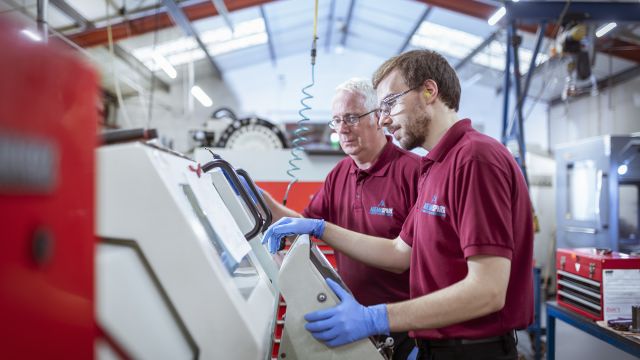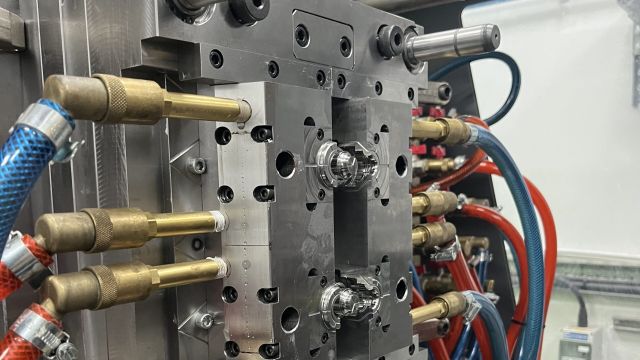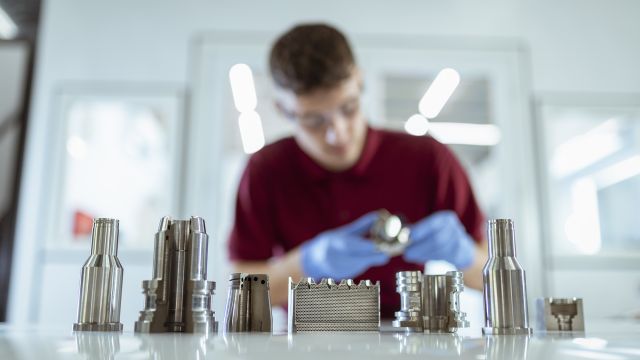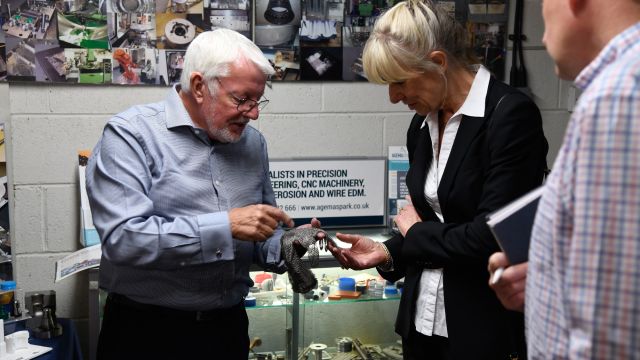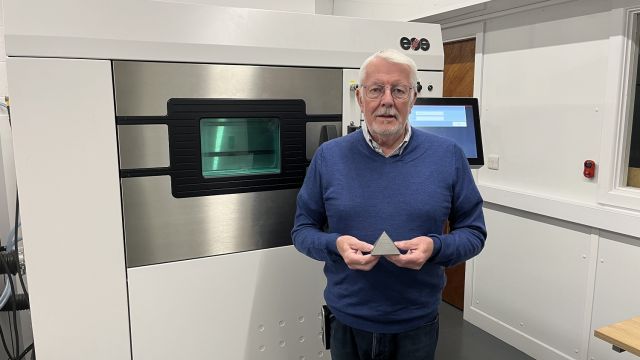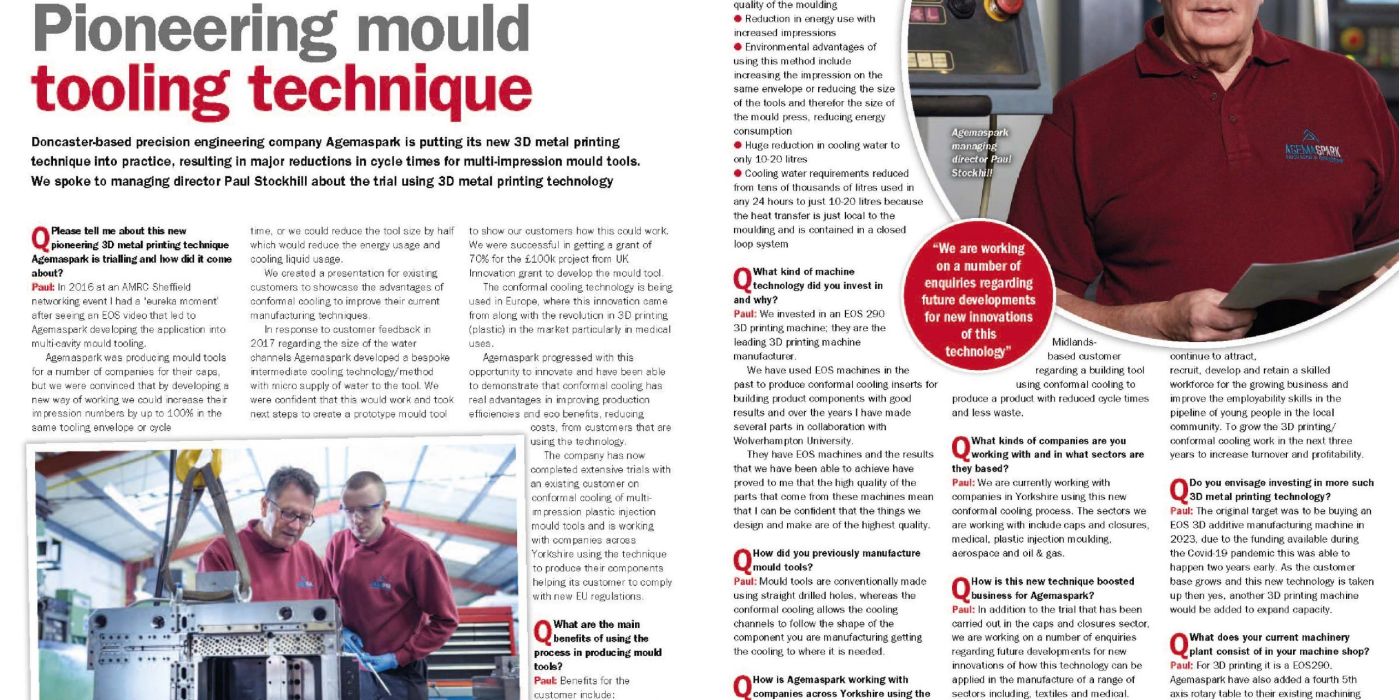
Pioneering mould tooling technique
Doncaster-based precision engineering company Agemaspark is putting its new 3D metal printing technique into practice, resulting in major reductions in cycle times for multi-impression mould tools. We spoke to managing director Paul Stockhill about the trial using 3D metal printing technology.
Q) Please tell me about this new pioneering 3D metal printing technique Agemaspark is trialling and how did it come about?
Paul: In 2016 at an AMRC Sheffield networking event I had a ‘eureka moment’ after seeing an EOS video that led to Agemaspark developing the application into multi-cavity mould tooling.
Agemaspark was producing mould tools for a number of companies for their caps, but we were convinced that by developing a new way of working we could increase their impression numbers by up to 100% in the same tooling envelope or cycle time, or we could reduce the tool size by half which would reduce the energy usage and cooling liquid usage.
We created a presentation for existing customers to showcase the advantages of conformal cooling to improve their current manufacturing techniques.
In response to customer feedback in 2017 regarding the size of the water channels Agemaspark developed a bespoke intermediate cooling technology/method with micro supply of water to the tool. We were confident that this would work and took next steps to create a prototype mould tool to show our customers how this could work. We were successful in getting a grant of 70% for the £100k project from UK Innovation grant to develop the mould tool.
The conformal cooling technology is being used in Europe, where this innovation came from along with the revolution in 3D printing (plastic) in the market particularly in medical uses. Agemaspark progressed with this opportunity to innovate and have been able to demonstrate that conformal cooling has real advantages in improving production efficiencies and eco benefits, reducing costs, from customers that are using the technology.
The company has now completed extensive trials with an existing customer on conformal cooling of multi-impression plastic injection mould tools and is working with companies across Yorkshire using the technique to produce their components helping its customer to comply with new EU regulations.
Q) What are the main benefits of using the process in producing mould tools?
Paul: Benefits for the customer include:
- 20% reduction in cycle time
- Results show that it is possible to reduce cycle times by up to 20% and at the same time increase the continued quality of the moulding
- Reduction in energy use with increased impressions
- Environmental advantages of using this method include increasing the impression on the same envelope or reducing the size of the tools and therefor the size of the mould press, reducing energy consumption
- Huge reduction in cooling water to only 10-20 litres
- Cooling water requirements reduced from tens of thousands of litres used in any 24 hours to just 10-20 litres because the heat transfer is just local to the moulding and is contained in a closed loop system
Q) What kind of machine technology did you invest in and why?
Paul: We invested in an EOS 290 3D printing machine; they are the leading 3D printing machine manufacturer. We have used EOS machines in the past to produce conformal cooling inserts for building product components with good results and over the years I have made several parts in collaboration with Wolverhampton University.
They have EOS machines and the results that we have been able to achieve have proved to me that the high quality of the parts that come from these machines mean that I can be confident that the things we design and make are of the highest quality.
Q) How did you previously manufacture mould tools?
Paul: Mould tools are conventionally made using straight drilled holes, whereas the conformal cooling allows the cooling channels to follow the shape of the component you are manufacturing getting the cooling to where it is needed.
Q) How is Agemaspark working with companies across Yorkshire using the technique to produce their components?
Paul: Agemaspark is currently working with a Yorkshire-based customer on a prototype regarding an upgrade for their plant in Europe and is also in discussions with a Midlands-based customer regarding a building tool using conformal cooling to produce a product with reduced cycle times and less waste.
Q) What kinds of companies are you working with and in what sectors are they based?
Paul: We are currently working with companies in Yorkshire using this new conformal cooling process. The sectors we are working with include caps and closures, medical, plastic injection moulding, aerospace and oil & gas.
Q) How is this new technique boosted business for Agemaspark?
Paul: In addition to the trial that has been carried out in the caps and closures sector, we are working on a number of enquiries regarding future developments for new innovations of how this technology can be applied in the manufacture of a range of sectors including, textiles and medical.
Q) Do you have further expansion plans to grow the business in future? If so, what are they?
Paul: The plans at the moment are to continue to attract, recruit, develop and retain a skilled workforce for the growing business and improve the employability skills in the pipeline of young people in the local community. To grow the 3D printing/conformal cooling work in the next three years to increase turnover and profitability.
Q) Do you envisage investing in more such 3D metal printing technology?
Paul: The original target was to be buying an EOS 3D additive manufacturing machine in 2023, due to the funding available during the Covid-19 pandemic this was able to happen two years early. As the customer base grows and this new technology is taken up then yes, another 3D printing machine would be added to expand capacity.
Q) What does your current machinery plant consist of in your machine shop?
Paul: For 3D printing it is a EOS290. Agemaspark have also added a fourth 5th axis rotary table to their existing machining capabilities which will enable a greater flexibility in the types of components we can manufacture, you can see this in action machining threads for mould tool components in our video.
Our machinery also includes:
- EDM wire erosion – one Fanuc Robocut Alpha 1IC 5-axis; two Joemars 655 5-axis and one ONA 740 5-axis
- EDM small hole drill – two Joemars manual small fast hole drill
- EDM sold sinkers – one Jomars NP50 CNC, one Jomars P50 CNC, one EZE 2030, two EZE 3040 CNCs and two 1450 Hurco’s.
- CNC milling – one Hardinge VMC 1000, one Fanuc Robodrill Alpha TZ1D, one XYZ 1510 HD VMC, and one XYZ 710 VMC, both with Siemens controls
- CNC turning – one Harrison Alpha CNC 1400XS, one Harrison Alpha CNC 1350S, one Hardinge Cobra 42 CNC precision turning centre with a Fanuc T21T and one Femco twin-turret CNC turning centre with Fanuc OT
- Grinding – two Eurospark auto surface grinders and one XYZ surface grinder
- Cylindrical grinding – one Jones & Shipman 1300 and Jones & Shipman 1400
- Quality & inspection – one Mitutoyo 574 CMM, one Romer Absolute Arm 7525SI with Integrated RS2 laser scanner
- CADCAM – three seats of Solidworks 2017, two seats of DEPOCAM and two seats of CAM 4-axis wire software
Q) How has business been generally for your precision engineering business and where has demand been strong?
Paul: In general, it has been ok, we are not yet back to 2019 levels primarily because of the aviation sector. The automotive sector has been buoyant, the plastic injection moulding sector has been looking at repairs and maintenance as well as new tool project.
Q) Do you plan to further increase the size of your overall plant in Doncaster with new investments?
Paul: In the long term yes over the next 12 months to two years.
Q) Are there any particular challenges that you are finding in general such as supply chain issues or material costs etc?
Paul: Some mainly delays in deliveries; delivery times have increased by 20 to 30%. Import/export costs have also increased.
Q) Has Agemaspark been recognised with any awards recently?
Paul: At this year’s Make UK Manufacturing Awards in Harrogate, we won the Innovation Award and were recognised for our innovative approach.
Our team are dedicated to finding innovative solutions and to have our new techniques recognised in this way is fantastic.
Innovation is vitally important to our business, we recognise the issues that companies face and the need for them to reduce their environmental impact while increasing efficiency and productivity and we can only do this by developing new, more efficient ways of working.
I was also included in this year’s Manufacturer Top 100 list as an inspiring leader and innovator.
It is a huge honour to be named in the Manufacturer Top 100 list and I am really proud to be representing Agemaspark, Doncaster and Yorkshire in this way.
To view the online edition of Machinery – December 2021 click here, our article is on pages 14 to 16
